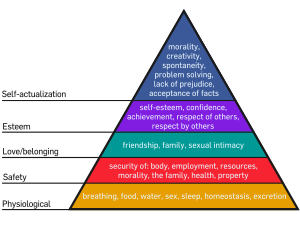It is a popular, although largely unexamined, belief that all cultures are equal. To quote Dr. Mark Glazer of the University of Texas, “According to the tenets of cultural relativism, there are no inferior or superior cultures; all cultures are equal. To order cultures in an evolutionary scheme is unfeasible. All premises of good and bad and/or upper and lower are culture bound and ethnocentric. Put that way, we can see that schemes of evolution are ethnocentric not objective.”
This belief is based upon emotions and does not stand up to even the lightest intellectual examination, and yet it is taught in almost every anthropology program in the United States.
The First Proof
To begin, define an object as “United States Culture, Current.” For the purposes of this exercise we will not need to define all of the attributes of this object, we can simply accept that this object reflects the set of attributes of the culture of the United States at this point in time.
Now, envision a change to this culture. Start a campaign to educate Americans on the evils of littering, for example. Define a new object as “United States Culture, Post-Litter.” Now, compare the two. Are they “equal”? If you define litter as bad, then the Post-Litter culture is superior. If you define litter as good, then the Current culture is superior.
The Second Proof
Cultures evolve constantly and every change is made for a reason. This implies that each change, each adaptation, provided some advantage over the previous way of living. Each advantage makes the culture “superior” to the previous version of itself.
The Third Proof
To believe that all cultures are equal, you must accept the unstated belief that culture has no purpose. If you define any purpose for culture, then some cultures will perform better than others at meeting that purpose.
But do cultures have a purpose? Yes. Humans are not like honey bees, where most necessary knowledge comes at birth. Humans are born with the ability to acquire language and culture. Culture is how humans learn to survive in the world. A culture which performs this task better is superior. A culture which taught that all babies should be neutered at birth would perform this task terribly and would be an inferior culture.
Cultural relativism teaches that all cultures are equal — that the culture which neuters all children at birth is equal to any other culture on Earth. To accept this belief, you must accept that a culture which causes it’s adherents to die out is equally good as one that causes it’s adherents to thrive.
An Approach for Cultural Objectivity
Cultural relativism became popular as a rejection of European cultural hegemony by European academics. They felt that the only solution to remove European bias from cultural studies was to deny the existence of any standards at all.
A more honest approach is one that aims for true objectivity, not rejecting the existence of standards, but accepting the existence of objective standards.
 As good a place as any to start with these standards is to judge each culture based upon how well it prepares it’s members to achieve the goals defined by Abraham Maslow’s Hierarchy of Human Needs.
As good a place as any to start with these standards is to judge each culture based upon how well it prepares it’s members to achieve the goals defined by Abraham Maslow’s Hierarchy of Human Needs.
Maslow was a psychologist, not a politician. His work, therefore, is criticized by those who feel that the items on the pyramid, or rather their order on the pyramid, should be modified to better reflect socialist ideals. Even this is not a rejection of the concept of objective values, only of the specific details of how we define these values. Perhaps there is a better chart than Maslow’s, or perhaps a better chart can be made.
Real work on defining objective standards cannot begin, however, until we first accept that objective standards do exist. The current rejection of objective standards by most academics prevents investment in the development of new knowledge. If all cultures are equal, then progress is an illusion — a waste of time and effort.
The social sciences have become dead sciences; they can record facts and details but they cannot make useful contributions to humanity. They have made themselves neutered and meaningless. While the “hard” sciences of math and engineering make enormous advances every year which radically improve the lives of billions of people, the social science remain stuck in a descriptive rut — an incredible waste of human potential.
The social sciences are adrift due to this rejection of objective goals. If all directions are equally valid, a ship will go nowhere. Only by choosing a direction can progress be made. But what if we choose incorrectly? Well, what if you drive your car to the wrong destination? You just start again and drive to a new destination — but you learn with each step. With each wrong direction you get closer to the truth. With our current denial of the value of directions, we’re not getting anywhere.